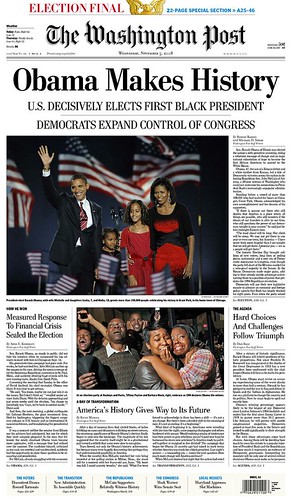(I know I said I'd post the conclusion of this "tomorrow..." but I finished writing it, and I just wanted to get the hell rid of it so I can get off my butt and focus on something else tomorrow... LOL!)
The original Electoral College system, the one our founding fathers wrote into the Constitution, had the state legislatures choosing the electors. A vote of the people had absolutely nothing to do with the process. The state legislatures were charged with choosing civic-minded gentlemen of high moral standing and good educational background, who would then get together and come up with the names of two candidates. The names would be sent to Washington, the one with the majority was named president, and the runner-up became vice president. If no one got a majority, the decision was thrown to the House of Representatives, because they were the body most closely representative of the people.
Much of the "power" over this process was delegated to the states. Later, it was the states that began instituting provisions for awarding their electoral votes based on popular votes, in response to pressure that the presidential election should more directly reflect the will of the people.
The system as it stands now is neither fish nor fowl…it isn’t what the founding fathers intended, nor is it a direct election by popular vote. Actually, it is kind of a mess. Especially the "winner take all" provision--I’m not clear on the genesis of that morsel, but it’s a ball-breaker. So, when Constitutional scholars admonish us not to fix it ‘cause it ain’t broke… Well, I beg to differ.
Then, there are the doom-sayers who are convinced that the country will go to hell in a handbasket if we abolish the Electoral College and allow the people to vote directly for president. They predict everything from the anarchy of dozens of small political parties fragmenting the vote to the point where there is no chance for a presidential candidate to garner a majority, (undermining the president’s ability to govern), to the increased chance of a military coup or counter-revolution occurring, should the result of a popular election be disputed.
I think those arguments are a bit…far-out. Our two-party system is pretty deeply entrenched. In fact, most of us wouldn’t mind if a credible alternative managed to break through the ranks. Our current Electoral College system effectively snuffs any third-party movement in this country. The funniest thing about this is, one of the original purposes of the Electoral College was to foil the formation of political parties altogether. Well, THAT hasn’t worked, has it? Now, it's being used to "protect" our two party system. Since partisan politics have become the "law of the land," maybe we need to encourage the possibility of a little competition for the two we have, just to give them something to think about…
And a military coup, or violent insurrection resulting from a disputed presidential election? Come on. This is America in the twenty-first century. Not some shaky, fledgling third-world democracy. We have more than 200 years of democratic tradition propping us up. I hardly think we are going to take up arms and storm Washington if we don’t like the outcome of an election.
BUT…
My research showed me that several models of replacement systems have been put forth, and none of them are practical, practicable, or affordable. Multiple run-off elections, "Instant run-off" elections, where the voter indicates his first, second, and third choice for the office…I’m not sure the American people would have the patience to deal with such things. The first and largest challenge to be overcome is the fact that any move to abolish the Electoral College would face all the tough hurdles of any potential change to our constitution: A long, hard fight through Congress, past which it could only advance to the people by a two-thirds majority vote. And then the people themselves have to ratify it by a two-thirds vote. Yikes! It could be done, I suppose. And I don’t dispute that it probably should be done. But, for that reason alone, it probably won’t be done.
Here’s MY thought (and Jackie’s, if you’ve read the comments on the last "installment’) Changes can be made to the way the STATES apportion their electoral votes, much more readily than the Electoral College can be completely abolished. I know, the states have already MADE changes…which have only added to the problems presented by the College. But, still, it seems like the path of least resistance…
Why can’t the states apportion their electoral votes based on the popular vote? If a candidate gets 40% of the popular vote, they win 40% of the electoral vote of that state. What’s with this "winner-take-all" thing anyway? That’s the source of a lot of the problems we’re experiencing, and it isn’t a provision of the federal Constitution. Two states—Maine and Nebraska—apportion their electoral votes in this manner. This would be at least a baby step in the right direction.
AND... here’s the solution that I came up with originally: That the total electoral votes be apportioned to the states based on their percentage of the TOTAL popular vote of that election. Example: Fifty million votes cast in the election. Alaska turns in one million of these. They get one-fiftieth, or 2%, of the electoral votes. In these days of instant transmission of information, how difficult would this be?
We might not get instantaneous results that Tom Brokaw and Dan Rather could report on the evening news, but we’d get results that were much more reflective of the will of the people. If Oregon did a spectacular job of educating the public and getting them out to the polls, and a "battleground" state like Michigan didn’t, the number of electoral votes each was rewarded would reflect this. If each churned out, say, two million votes, each would get the same number of electoral votes. Instead of Oregon getting its 7 and Michigan getting its 17, regardless of how many people actually voted. Though this would still involve amending the Constitution, it would solve the problem of how to replace the Electoral College system with something that wouldn’t fundamentally affect (and therefore try the patience or the attention span of) the every day voter. We would go to the polls on one day for one election and vote for one candidate. The only thing that would change is the way that vote is counted once it is placed.
This would, at the very least, force the candidates to address the entire nation during their campaigns, because they would never really know where the biggest concentration of electoral votes would be coming from. It would make them take us ALL seriously, think about ALL of our problems, as they would have to do as president. And it would make the electoral vote much more reflective of the actual popular vote. Does it work for you?


















Wow Lisa, I am very impressed. I like the way you think it makes perfect sense, which is why your idea will probably not get much attention from our "elected" know it alls!
ReplyDeleteyup. But I'm still up for a complete popular vote.
ReplyDeleteYou have really thought this through, and I love your reasoning. I think you've proposed a viable alternative, and now I'm wondering how to act on it.
ReplyDeleteGood ideas. I really like the part about the candidates having to pay attention to all of us because they can't be sure where the votes are going to come from. There are so many things now that cross state borders. The electoral college was seen as a way to protect the small states from the large states. The founders couldn't have forseen our mobility, the power of corporations and lobbyists, and the almost instantaneous communications we have now.
ReplyDeleteI have a feeling that this entry has roots in the 2000 election. I also have the feeling that if Algore would have won that this entry would not exist. I belive that America generally gets what America votes for. November may prove me wrong. I was wrong once before, I think. Bill Clinton was elected the first time with 43% of the the popular vote. I did not hear a single Democrat harp against the "system". George W Bush was elected with a satistical dead heat(or is it heap) along with Algore. Now the system is bad. By the way. Ronald Regan had the most votes cast for him in any election. Albert Gore had the second most ever. George W. Bush had the third most amount of popular votes ever. Give him a break. Gore decided to spend the last days of the election off 2000 trying to re-win California and he did by a large margin. But Bush was in Arkansaw and Tennesee, winning both states. If you cant win your home state,dang...By the way VP Edwards will not carry his home state...the people who know him best...Nice flowers. Im alergic though. W 04 have a nice evening thomas
ReplyDeleteI like your recommendations. I don't understand why we couldn't just go by a straight popular vote. If the margin is too close by a predetermined amount, a recount (eek) would automatically occur. If it was unable to clearly establish the winner than some type of runoff between the top two.
ReplyDeleteThese were great entries Lisa. Well thought out and well written. :-) ---Robbie
Wow, Lisa! I read this 'lecture series' ;) when you first posted but didn't have time to comment.
ReplyDeleteI wanted to say 'Thankyou!' You've provided quite a primer on the electoral college and educated this voter, for one. I agree the system is antiquated and useless; your solution sounds reasonable, although I don't really understand why a direct one person/one vote isn't viable. I'm perfectly willing to wait for the results. As it happens, the LA Times had a great commentary on the subject on Wed. I'll get you the link...or are you sick of the subject?
Great job! :)